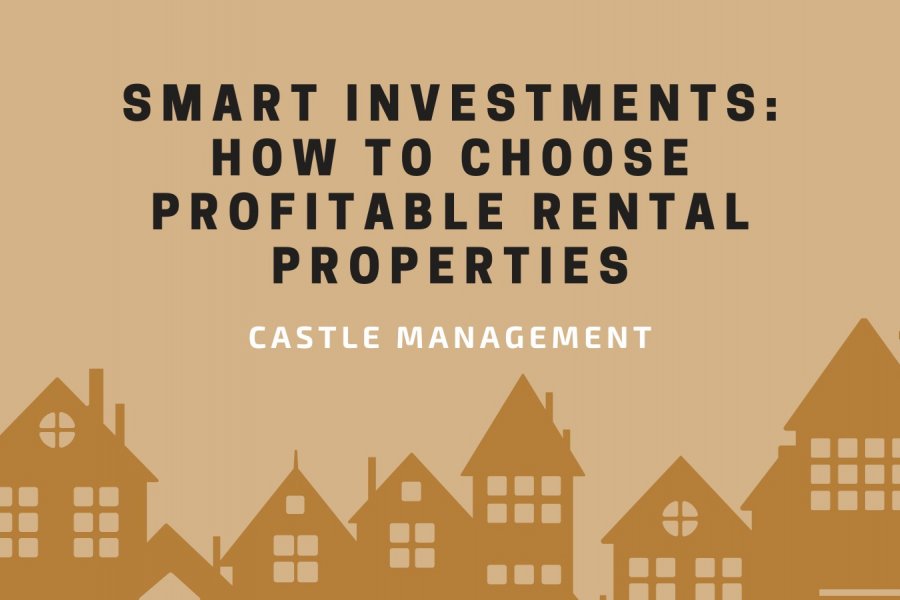
Investing in rental properties remains one of the most reliable ways to build wealth and secure financial stability. However, not all rental properties are created equal. Choosing the right property can make the difference between steady passive income and a financial drain.
At Castle Management we’ve created this article to help guide landlords through the essential steps to identify profitable rental properties.
Key Factors to Consider When Choosing an Investment Property
1. Location is Key
The mantra "location, location, location" remains relevant for a reason. A property's location affects everything from rental demand to long-term appreciation.
- Proximity to Key Amenities: Look for properties near schools, hospitals, shopping centers, and public transportation. These attract reliable, long-term tenants.
- Local Employment Opportunities: Areas with job growth tend to have higher demand for rental properties. Research employment trends and upcoming business developments.
- Neighborhood Quality: Safe, well-maintained neighborhoods command higher rents and attract responsible tenants.
- Vacancy Rates: Check local vacancy rates to gauge demand. High vacancy rates may indicate oversupply or low tenant interest.
Before committing to a property, visit the area multiple times, talk to locals, and research long-term trends.
2. Understand Rental Market Dynamics
Before purchasing, analyze the local rental market:
- Average Rent Prices: Compare potential rental income with your mortgage payments, property taxes, insurance, and maintenance costs.
- Rental Demand Trends: Is there consistent demand for rentals, or does the market fluctuate seasonally?
- Future Development Plans: Upcoming infrastructure or commercial developments can boost rental demand and property values.
The 1% Rule: The monthly rent should be at least 1% of the property's purchase price.

3. Calculate ROI and Cash Flow
Profitability in rental properties depends on two key financial metrics: Return on Investment (ROI) and Cash Flow.
ROI Formula:
ROI = (Annual Rental Income – Annual Expenses) ÷ Property Price × 100
A good ROI for rental properties typically ranges between 5% and 10%. After covering mortgage payments, property taxes, insurance, and maintenance, ensure you have a positive monthly cash flow. Accurate financial analysis is crucial before making a decision.
4. Property Condition
A lower-priced property might seem attractive, but hidden repair costs can quickly turn it into a money pit.
- Inspection: Always get a professional home inspection before purchasing.
- Maintenance Costs: Older properties often require more frequent repairs. Budget at least 1% of the property value annually for maintenance.
- Renovation Potential: Sometimes, small upgrades like fresh paint, modern fixtures, or improved landscaping can significantly boost rental value.
Investing in a well-maintained property reduces unexpected expenses and tenant turnover.
5. Financial Preparedness
Even with positive cash flow, landlords must prepare for unexpected expenses:
- Emergency Fund: Set aside at least three months' worth of mortgage payments for emergencies.
- Property Insurance: Invest in comprehensive landlord insurance for property damage and liability coverage.
- Legal Compliance: Be familiar with local landlord-tenant laws to avoid costly legal issues.
Financial readiness ensures you can handle challenges without jeopardizing your investment.
6. Hire a Professional Property Management Company
While some landlords prefer a hands-on approach, hiring a professional property management company can significantly enhance the profitability and sustainability of your rental property investment.

Benefits of a Property Management Company
- Efficient Tenant Screening: Property managers have experience vetting tenants, reducing the risk of missed rent payments or property damage.
- Reduced Vacancy Rates: Professionals know how to market properties effectively and set competitive rental rates to minimize vacancies.
- Timely Rent Collection: Property managers enforce rent payment policies, ensuring consistent cash flow.
- Legal Expertise: They stay updated on local landlord-tenant laws, helping landlords avoid costly legal disputes.
- Property Maintenance and Repairs: Management companies handle routine maintenance and emergencies, ensuring tenant satisfaction and preserving property value.
- Time Savings: For landlords with multiple properties or full-time jobs, property managers save significant time and effort.
When Should You Hire a Property Manager?
- If you own multiple properties.
- If you live far from your rental property.
- If you lack time to handle day-to-day management tasks.
- If you're unfamiliar with landlord-tenant laws.
While hiring a property management company comes with a cost, the value they provide often outweighs the expense.
7. Plan for Tenant Retention
High tenant turnover can significantly reduce profits. Focus on tenant retention by building strong relationships with your renters. You can do this by:
- Responding promptly to maintenance requests.
- Keeping the property in excellent condition.
- Offering lease renewal incentives.
Satisfied tenants are more likely to stay long-term, reducing vacancy costs.
8. Stay Informed and Adaptable
The rental market is always evolving. Stay updated on market trends, local laws, and economic developments. Attend real estate investment seminars, read industry reports, and network with other landlords.

Bottom Line
Investing in rental properties can be highly rewarding, but achieving success requires careful planning, market expertise, and strategic decision-making. At Castle Management, we specialize in guiding investors through every step of the process, from selecting the ideal location and analyzing financials to providing expert property management services.
By partnering with Castle Management, you’ll benefit from our in-depth knowledge of the market, allowing you to maximize returns, minimize risks, and build long-term, profitable rental properties. Whether you're a seasoned investor or just starting, our professional support will help you navigate the complexities of property management and ensure your rental business thrives.
Let Castle Management be your trusted partner in taking your rental investment to the next level. Contact us today!
